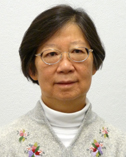
Louise T. Chow
University of Alabama at Birmingham
|
Primary Section: 26, Genetics Secondary Section: 21, Biochemistry Membership Type:
International Member
(elected 2012)
|
Biosketch
Louise T. Chow is Distinguished Professor and holds the Anderson Family Endowed Chair in Biochemistry and Molecular Genetics. She obtained her BS from National Taiwan University in Agricultural Chemistry (1965) and PhD from Caltech in Chemistry (1973) under the guidance of Prof. Norman Davidson. After postdoctoral training at UCSF, she joined Cold Spring Harbor Laboratory (1975) as a Fellow and was rapidly promoted to tenured Senior Scientist (1979). She and her husband and collaborator Prof. Thomas Broker moved to University of Rochester in 1984 and then to UAB in 1993. At CSHL, using electron microscopic analyses of nucleic acid heteroduplexes, she deciphered the sequence arrangements and functions of bacteriophage genes and bacterial insertion sequences. In 1977, she and collaborators discovered split genes and mRNA splicing in human adenovirus transcripts. In collaborative work, she also characterized many higher eukaryotic genes for their exon-intron arrangements. For four decades, her lab has investigated the pathobiology and gene functions of mucosotropic human papillomaviruses. Using EM heteroduplexes and RT-PCR, their work characterized spliced HPV mRNAs in lesions. With in situ methods, their studies demonstrated squamous differentiation-dependent gene expression, viral DNA amplification and virus production, whereas in cancers viral genomes often became integrated into host chromosomes.
Research Interests
The lab established the first experimental model system which produces robust infectious HPV-18 in differentiating organotypic raft cultures of primary human keratinocytes cultured at the liquid medium/air interface. Raft cultures of PHKs transduced with HPV E6, E7 oncogenes and of cervical cancer cell lines simulate dysplasias or cancers, respectively. Using these cultures, the lab has identified pathways, in particular the DNA damage response, which HPV activates to support viral DNA amplification and viral pathogenesis. Rationally selected pathway-specific inhibitors effectively stop productive infection and cancer cell growth. The lab also characterizes inhibitory effects of compounds supplied by biotech companies. Dr. N. Sanjib Banerjee in the lab additionally established organoid raft cultures (ORCs) or xenografts of primary cervical cancer (PDXs) in SCID mice. ORCs can also be used to initiate PDXs or 3-dimensional organoids in multi-well plates. These reciprocal and complementary in vitro and in vivo systems are used to evaluate and repurpose inhibitors as therapeutic candidates to treat HPV-cancers. Together with long-time collaborator Dr. Zhi-Ming Zheng of NCI, her lab has helped characterize altered expression of host protein-coding genes and noncoding miRNAs and lnc RNAs across the stages of carcinogenesis. These changes potentially serve as biomarkers for viral carcinogenesis.

